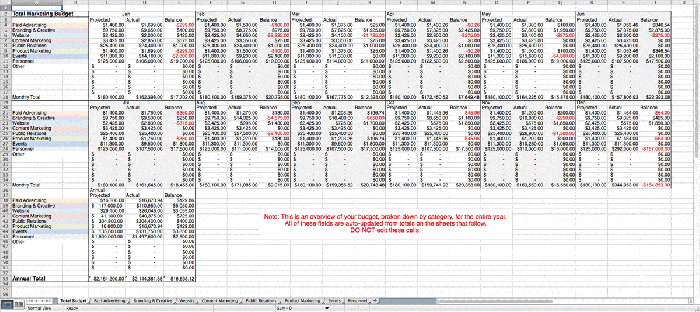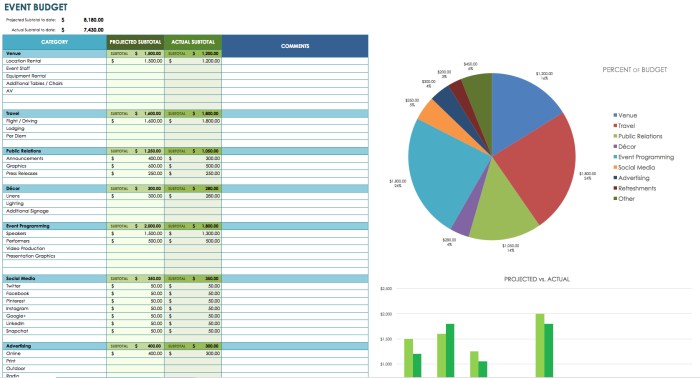Developing a Marketing Budget takes center stage in the business world, where financial decisions shape success. Dive into this guide for insightful tips and tricks to navigate the budgeting process with finesse.
From understanding the importance of budgeting to exploring effective allocation strategies, this comprehensive overview will equip you with the knowledge needed to make impactful marketing decisions.
Importance of Developing a Marketing Budget
Creating a marketing budget is crucial for businesses as it helps them allocate resources effectively and maximize their marketing efforts.
Benefits of Having a Well-Thought-Out Marketing Budget
- Allows for Strategic Planning: A well-planned marketing budget helps businesses strategize their marketing campaigns and initiatives for better results.
- Resource Allocation: It ensures that resources are allocated efficiently to various marketing channels according to their effectiveness and ROI.
- Measurable Results: Having a budget in place allows businesses to track and measure the success of their marketing efforts, making it easier to adjust strategies if needed.
Examples of How a Marketing Budget Can Impact a Company’s Success
- Increased Brand Awareness: By investing in marketing activities such as advertising and social media campaigns, businesses can boost their brand visibility and reach a wider audience.
- Higher Sales and Revenue: A well-managed marketing budget can lead to increased sales and revenue as targeted marketing efforts are more likely to convert leads into customers.
- Competitive Advantage: With a solid marketing budget, businesses can stay ahead of competitors by implementing innovative strategies and reaching their target market effectively.
Factors to Consider When Developing a Marketing Budget

When creating a marketing budget, businesses need to take into account several key factors to ensure the effectiveness of their marketing efforts.
Market Research, Developing a Marketing Budget
Market research plays a crucial role in determining the marketing budget. By understanding the target market, competition, and industry trends, businesses can allocate their budget more strategically. This data-driven approach helps in optimizing marketing efforts and maximizing ROI.
Setting Clear Objectives and Goals
It is essential to set clear objectives and goals when allocating a marketing budget. By defining specific targets, businesses can prioritize their spending on activities that align with their overall marketing strategy. This ensures that resources are utilized efficiently and effectively to achieve desired outcomes.
Strategies for Allocating Funds in a Marketing Budget
When it comes to allocating funds in a marketing budget, it is crucial to have a well-thought-out strategy in place. By prioritizing high-impact marketing activities and distributing funds effectively across various channels, businesses can maximize their return on investment and reach their target audience more efficiently.
Utilize Data and Analytics
Using data and analytics to track the performance of different marketing channels can help businesses allocate funds to the most effective platforms. By analyzing metrics such as conversion rates, click-through rates, and customer engagement, companies can identify which channels are driving the most value and adjust their budget accordingly.
- Utilize tools like Google Analytics to track website traffic and user behavior.
- Use CRM systems to monitor customer interactions and track the effectiveness of marketing campaigns.
- Allocate more funds to channels that are generating a higher return on investment.
Focus on High-Impact Activities
Prioritizing high-impact marketing activities in the budget can help businesses achieve their goals more effectively. By investing in strategies that have a proven track record of success, companies can maximize their marketing efforts and drive better results.
- Invest in content marketing to establish thought leadership and engage with your target audience.
- Allocate funds to social media advertising to reach a larger audience and drive brand awareness.
- Consider influencer marketing to leverage the reach and credibility of popular personalities in your industry.
Allocate Budget Across Multiple Channels
Diversifying your marketing budget across multiple channels can help businesses reach a broader audience and drive more leads and conversions. By investing in a mix of online and offline channels, companies can maximize their reach and engage with customers at different touchpoints.
- Allocate funds to digital marketing channels such as social media, email marketing, and search engine optimization.
- Invest in traditional marketing channels like print ads, radio spots, and direct mail campaigns to reach offline audiences.
- Consider allocating a portion of your budget to experimental channels to test new strategies and drive innovation.
Monitoring and Adjusting a Marketing Budget

Monitoring and adjusting a marketing budget is crucial to ensure that resources are allocated effectively and efficiently throughout the campaign. By keeping a close eye on the budget, businesses can make real-time adjustments to optimize their marketing efforts and maximize return on investment.
Key Performance Indicators (KPIs) for Budget Evaluation
- Return on Investment (ROI): Calculated by dividing the net profit generated from marketing efforts by the total marketing costs, indicating the effectiveness of the budget.
- Customer Acquisition Cost (CAC): Shows how much it costs to acquire a new customer, helping to determine if the budget is being spent efficiently.
- Conversion Rate: Measures the percentage of leads that turn into customers, indicating the impact of marketing activities on driving sales.
- Website Traffic and Engagement: Analyzing website metrics like traffic, bounce rate, and time on site can provide insights into the effectiveness of marketing campaigns.
Strategies for Adjusting the Budget
- Reallocation of Funds: Based on the performance of different marketing channels, funds can be shifted to those that are delivering the best results.
- A/B Testing: Experimenting with different budget allocations for specific campaigns can help identify the most effective strategies and adjust accordingly.
- Data Analysis: Regularly analyzing performance data and metrics can provide valuable insights for making informed decisions on budget adjustments.
- Seasonal Adjustments: Adapting the budget based on seasonal trends and consumer behavior can help maximize the impact of marketing efforts during peak periods.





